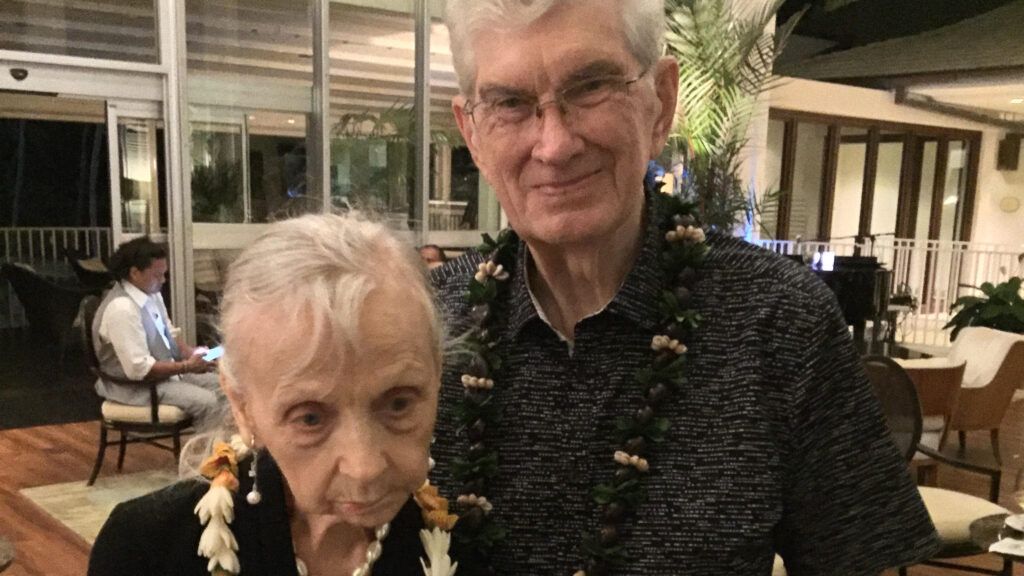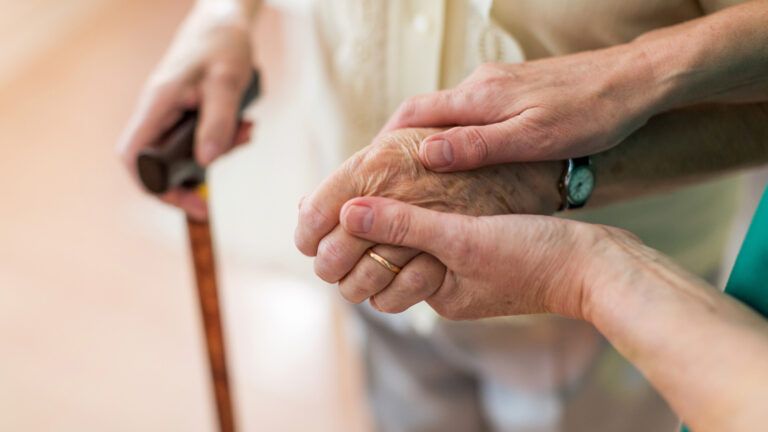Richard and Arlene Boyd have a standing date on Saturday evenings at Veranda in the Grand Lobby of the Kahala Hotel and Resort in Honolulu, Hawaii. When jazz pianist and singer David Swanson begins his set, they’re the first (and sometimes the only) couple up on the dance floor.
After 61 years of marriage, the couple has endured Arlene’s throat cancer, the death of one of their three sons from pancreatic cancer, and since 2009, Arlene’s Alzheimer’s disease. Saturday night dancing helps them heal and reminds Richard of their old life together.
“Every Saturday and Sunday when our boys were young, we would go out some place,” Richard tells Guideposts.org of how the Detroit natives began their dancing tradition. The couple would search for jazz clubs in the Warehouse district of the city. “Every weekend, she was my date, my little sweetie.”
Arlene was 16 when they met and Richard was 18. He worked at a Detroit gas station pumping gas when Arlene walked by with a friend. He couldn’t keep his eyes off of her.
“Next thing you know, my shoes were filled with gas! I was filling up a gas tank and the driver said, ‘I think it’s full.’ We got a good laugh out of it.” But Arlene and her friend were long gone down the street. Richard vowed to keep his eyes open for her in case she came back.
A week later, she walked by again and Richard was ready. He caught up to her and asked her out to the Dairy Queen. She said yes. “Do you dance?” He asked her on that first get together. She didn’t. It was against her religion. But Richard had been trained to dance like Fred Astaire since he was a small child. “I told her, ‘if we’re going to date, we’ll be dancing.'”
In no time, the two were inseparable. “It just felt right,” he says of their relationship. “Comfortable. I didn’t have to try to think up things to say. We could go some place and sit there, quiet, just being with each other.”
Eventually, she got a job at the bookstore at his college and they would take their brown-bag lunch breaks together in his car in the parking lot. “I happened to go into the bookstore one day when I knew she was there and I saw she had scribbled ‘Arlene J. Boyd’ [my last name] on the pad. She was practicing. I said to myself, ‘I think I got the right one.”
After breaking up for just a week or two–Arlene wanted to be married like her siblings before she was 19 and Richard wanted to finish college first–the couple got engaged. “I said to myself [about breaking up], ‘You know, that’s really stupid.’ So I called her up, said ‘Let’s get engaged.'”
Years later, the couple was happily raising three sons and Richard was working as an engineer and then a real estate agent. Whenever Richard needed to show a house in his neighborhood to a client, he would always take them straight to his home, because even with three boys, Arlene kept their house immaculate.
“Now that I have to do all the laundry, cooking and cleaning and all that [because of her Alzheimer’s], I’m realizing how much work that really was. I might have been gone 10 to 12 hours a day designing machines as an engineer, but I think she had the harder job. She never complained, so I don’t complain. She’s just amazing.”
Being the family breadwinner, Richard started thinking about what might happen to Arlene and their young kids if something were to happen to him. He didn’t want her to have to remarry somebody else just to be able to take care of the family in his absence, so he encouraged her to have a career.
“I knew I was taking a chance when I got her out of being a stay-at-home mom, because now she’s out in the public and she’s so cute and other people could notice, but you’ve got to gamble. I took a chance and she didn’t change horses! So, I thought that was pretty special. How do you know if somebody really loves you? You give them their freedom. I guess she must think I’m all right because she stayed with me,” he says with a laugh.
Arlene rose in the ranks in her career in retail and then moved over to her husband’s field of real estate. She scored 100% on her broker’s license test and excelled as an agent. “I knew she was smart but I didn’t know she was that smart. I was in the top 3% of the agents in the metropolitan area, but she sold circles around me. I knew and I still know that I picked the right one. I always figured I married up. She could’ve had anybody.”
Dancing Through Alzheimer’s |
When Richard turned 50 and Arlene 48, they decided to take their real estate business and move to their own paradise in Honolulu. They’ve been there for 30 years now. Alzheimer’s has been a part of Arlene’s family history, so they both knew it was a possibility for her.
“Her mother and father both died of Alzheimer’s. Her oldest brother passed away recently form Alzheimer’s and her next sister down, she’s still alive, but she’s got signs of it. Her twin sisters, Eleanor and Ellen–right now Eleanor is in hospice care; she’s probably got a week left. And Ellen passed away a year and a half ago. Arlene’s the last one and she’s got it too, and so that’s how it goes.”
Though it’s challenging being a caregiver for his wife, Richard has dedicated himself to the role.
“My goal in life is to make sure she doesn’t have any stress, that she has a nice, smooth ride. When she talks to me, she maybe starts out a sentence and forgets, but a good husband always agrees [with whatever she says]. If I made a mistake in agreeing, I quickly correct it. My job is to make sure she doesn’t feel awkward or like anything’s wrong.”
It’s a tool he says works to great effect. “I’ve seen many people in those awkward moments, they feel frustrated. I see people keep asking [a person with Alzheimer’s to] repeat and repeat [what they were trying to say]. That’s not right. Just talk to them like you understand what they’re saying.”
Even in his moments of frustration with Alzheimer’s, he still finds things that he’s grateful for. “Arlene’s also got the gene where she’s super sweet, super nice. I’ve seen people be difficult with Alzheimer’s, but she’s just as sweet as she can be.”
And she still loves to dance with him. They’d stopped their tradition when Arlene got sick, but four years ago, when their son passed away, they started back up again.
“She’s not as agile as she used to be. For the slow songs, I have to get her to move her feet. The last time we went out dancing, she heard a song she liked and she was trying to pull me up! She’s still got the spirit in her. With her Alzheimer’s it’s really tough to see the girl that was,” Richard says. “Now, it’s the girl that is. But, she’s still my girl. I’ll take any part of her that I can get.”
Now, they have another family–the staff at the Kahala Hotel and Swanson, the jazz musician. He always plays Ed Sheerhan’s “Thinking Out Loud” and John Legend’s “All of Me,” for the couple to dance to.
When Arlene was in the hospital recovering from pneumonia recently, staff members came to visit her. “They’re all busy and have their own lives, but they still stopped by,” he says, touched by their thoughtfulness. “It’s kind of what Hawaii [and the aloha spirit] is all about.”
Now, at 79 years old, she’s out of the hospital and back on the dance floor.
When asked if dancing helps her remember their life together, Richard says, “It can’t hurt. And it’s fun to hold my cutie.”
Get practical spiritual advice for everyday challenges in Spiritual Remedies






